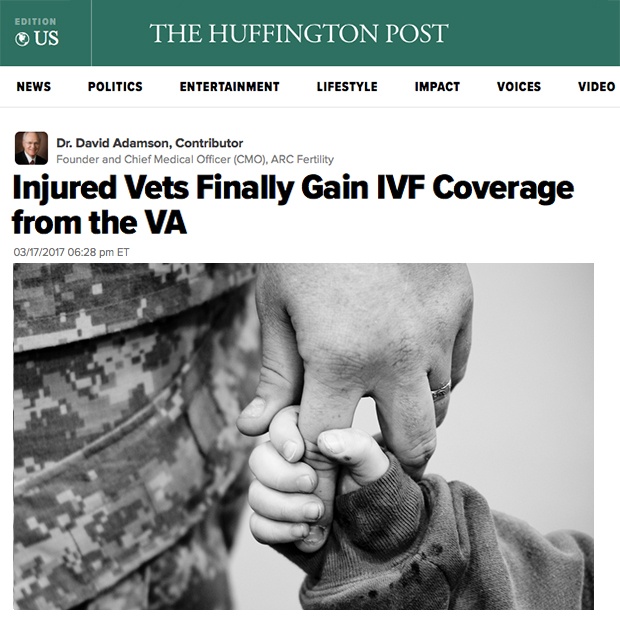Every couple dealing with infertility faces challenges. This often includes problems with access to affordable infertility services such as in vitro fertilization (IVF). For one group – wounded American veterans – an outdated 30-year ban on funding for IVF made family-building a distant dream for those already dealing with devastating service-related injuries.
Back in the early 1990’s, Congress enacted a ban that prevented the Veterans Administration (VA) from providing IVF to patients at a time when it was new and a bit controversial. Although IVF has now been a well-accepted treatment for some time, vets still lacked coverage until recently.
With strong advocacy by patients and organizations including the American Society for Reproductive Medicine (ASRM), RESOLVE: The National Infertility Association, ARC Fertility and others, Congress in 2016 temporarily lifted – but did not overturn – the prohibition on VA funding of medically appropriate IVF.
VA funding is now in place through September 2018 to offer IVF to severely wounded veterans with a service-connected injury. This means they will now receive the same infertility benefit as their active duty counterparts under the Department of Defense, fixing an inequity between care offered to active duty service members vs. veterans. The VA is currently in the process of signing up clinics to participate in their provider network to deliver the finally available infertility services.
Applauding Congressional action on VA funding, Owen K. Davis, MD, ASRM President referred to the ban as “outdated and cruel” adding “Modern medicine cannot undo their wounds, but by lifting the ban on IVF treatments, we can at least deploy our best tools to help them.”
According to Wounded Warrior Project Chief Strategy Officer, Jeremy Chwat “Because of injuries, especially blast injuries from improvised explosive devices, many veterans of the Iraq and Afghanistan conflicts have tragically lost the ability to have children. After they transition out of the military, affected veterans are left without the basic ability to start a family and move on with their lives.”
While waiting for Congress to act, members of the Society for Assisted Reproductive Technology (SART) decided to offer help through member clinics across the country. Through participation in the ASRM/SART’s “Service to Veterans” program, individual infertility clinics stepped up to provide deeply discounted IVF services to injured veterans. While program details varied from clinic to clinic, most offered at least a 50% discount to veterans whose service-related injuries impaired their fertility. Clinics used the same eligibility criteria developed by the Department of Defense for active-duty personnel.
Enacting this much-needed change in policy took 5 years and work is not yet finished. Members of Congress will be introducing legislation to permanently overturn the VA IVF funding prohibition. To help with getting the legislation introduced, co-sponsored, and passed, once again, groups that advocate for patient access to infertility services – including ASRM, RESOLVE and ARC Fertility – will be active in promoting patient awareness.
On May 18, RESOLVE will hold its annual Advocacy Day to promote awareness of infertility and advocate for coverage for needed care. This year – in partnership with ASRM – those visiting Capitol Hill to meet with Members of Congress will make sure to discuss the need for permanently overturning the VA ban on IVF funding.
To describe what’s needed for the most effective advocacy, Barbara Collura, President/CEO of RESOLVE notes that “members of Congress have asked me and our advocates – ‘Where are the doctors? We need the entire community, including physicians and nurses and embryologists, to come to Advocacy Day. Access to Care is supported by all of us, and showing up and advocating is the best way to see real change happen for our community.”
To learn more about how you can participate in making the VA change permanent and improve access to infertility coverage for all patients, click here.


